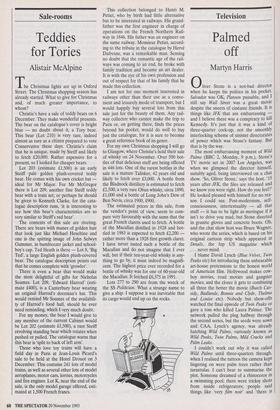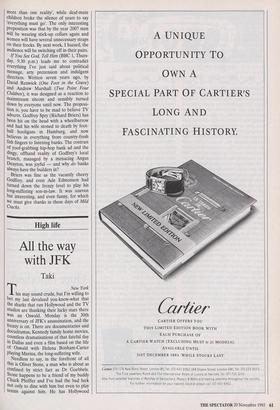Television
Palmed off
Martyn Harris
Oliver Stone is a not-bad director when he keeps his politics in his pocket. Salvador was OK, Platoon passable, and I still say Wall Street was a great movie despite the sneers of cineaste friends. It is things like JFK that are embarrassing — and I believe there was a conspiracy to kill Kennedy. It's just that it was a kind of three-quarter cock-up, not the smoothly interlocking scheme of sinister directorates of power which was Stone's fantasy. But that is by the way. The most embarrassing moment of Wild Palms (BBC 2, Monday, 9 p.m.), Stone's TV movie set in 2007 Los Angeles, was when we glimpsed the director himself, suitably aged, being interviewed on a chat show. 'So, Oliver Stone,' says the host. '15 years after JFK, the files are released and we know you were right. How do you feel?' He looked pleased with himself for no rea- son I could see. Post-modernism, self- consciousness, intertextuality — all that stuff — it has to be light as meringue if it isn't to drive you mad, but Stone directed in granite gloves and concrete boots. Oh, and the chat show host was Bruce Wagner, who wrote the series, which is based on his original cartoon strip which appeared in Details, the hip US magazine which . . . never mind.
I blame David Lynch (Blue Velvet, Twin Peaks etc) for introducing these unbearable art-house pretensions to the honest world of American film. Hollywood makes cow- boy movies, road movies and gangster movies, and the closer it gets to combining all three the better the movie (Butch Cas- sidy, Badlands, Bonnie and Clyde, Thelma and Louise etc). Nobody but show-offs watched the final episode of Twin Peaks or gave a toss who killed Laura Palmer. The network pulled the plug halfway through the second series, but the seeds were sown and CAA, Lynch's agency, was already hatching Wild Palms, variously known as Wild Peaks, Twin Palms, Mild Cracks and Palm Leaks.
I couldn't work out why it was called Wild Palms until three-quarters through, when I realised the tattoos the camera kept lingering on were palm trees rather than tarantulas. I can't bear to summarise the plot. Someone dreamed of a rhinoceros in a swimming pool; there were tricksy shots from inside refrigerators; people said things like 'very film noir' and 'there is more than one reality', while deaf-mute children broke the silence of years to say everything must go', The only interesting proposition was that by the year 2007 men will be wearing stick-up collars again and women will have several unnecessary straps on their frocks. By next week, I hazard, the audience will be switching off in their pairs.
If You See God, Tell Him (BBC 1, Thurs- day, 9.30 p.m.) leads me to contradict everything I've just said about political message, arty pretension and indulgent direction. Written seven years ago, by David Renwick (One Foot in the Grave) and Andrew Marshall (Two Point Four Children), it was designed as a reaction to mainstream sitcom and sensibly turned down by everyone until now. The proposi- tion is, you have to be mad to believe TV adverts. Godfrey Spry (Richard Briers) has been hit on the head with a wheelbarrow and had his wife stoned to death by foot- ball hooligans in Hamburg, and now believes in everything from country-fresh fish fingers to listening banks. The contrast of yoof-grabbing hip-hop bank ad and the dingy, offhand reality of Godfrey's local branch, managed by a menacing Angus Deayton, was joyful — and why do banks always have the builders in?
Briers was fine as the vacantly cheery Godfrey, and even Ade Edmonson had turned down the frenzy level to play his long-suffering son-in-law. It was uneven but interesting, and even funny, for which we must give thanks in these days of Mild Cracks.











































































 Previous page
Previous page